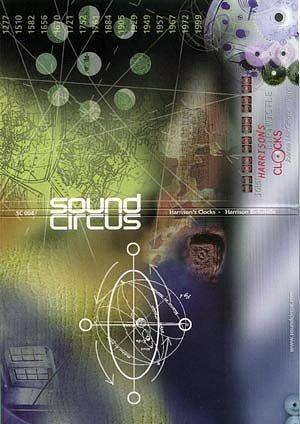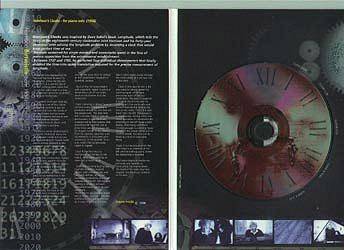
This is one of the most important piano works to have appeared towards the
end of the 20th century. After Joanna MacGregor's exclusive
rights expire, every aspiring new music pianist will tackle these five pieces,
and they will take their place in the 2000 piano repertoire alongside the
Ligeti studies, which seemed so impossible at first and are now standard
repertoire. There will be other recordings of Harrison's Clocks, but
this is a worthy first.
They were inspired by the Sobel book Longitude, about the painfully
prolonged gestation of John Harrison's sea clocks, now preserved at Greenwich;
and the link with Harrison Birtwistle's shared name. There are five substantial
pieces, each starting with a rush of notes down to the bottom of the keyboard.
In Clock I irregular contrary motion and staccato figures are deliberately
out of phase. Next a mechanical fantasy with an alarm bell. Clock III
variously combines six figures in pairs. Clock IV introduces each
of its four sections by repeating the opening signal of the whole work. The
last is a toccata with reversed delays between the hands, ending, as each
piece does, 'because the clock-spring has broken down', as explained in Stephen
Pruslin's helpful notes.
Heard without worrying about all that, they are fascinating and exhilarating
virtuoso display pieces. The performances by Joanna MacGregor, and recording,
at Dartington, are impeccable, mind-bogglingly so. (Her performance in the
Proms was reviewed by
S&H,
August '99)
Jewel cases seem to be on the way out? In a slimline cardboard case, slender
for storage in bulging collections, the presentation and artwork are delightful,
save only for not resisting the temptation to compromise legibility by
fashionable over-printing; no matter, reading all the information is worth
the effort! Naughty (and unnecessary) to suppress the total duration, revealed
on my CD player - only afterwards did I spot that the individual timings
are given, in tiny print, to be found around the CD when it is replaced in
the case!

Sound Circus CDs are mid-price, and this is one to play over and over again,
so complex and swift is the musical thought. If this latest release on Joanna
MacGregor's own label enjoys the success it deserves, perhaps a recording
of Birtwistle's piano concerto, which Joanna MacGregor premiered, may follow?
Enjoyment is enhanced immeasurably by listening with the inexpensive score
(Boosey&Hawkes). Although it requires a consummate pianist and musical
mathematician to get round these fiendishly complex constructions at the
keyboard, exploring some of the patterns with the score (if only at quarter
speed and one hand at a time) offers a window into creativity!
Reviewer
Peter Grahame Woolf
